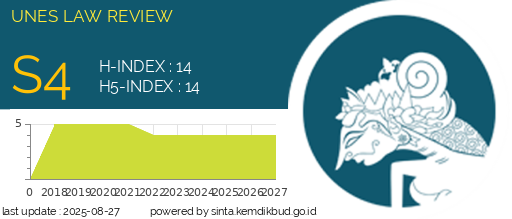KAJIAN KRIMINOLOGI TERHADAP TAWURAN YANG BERPOTENSI TINDAK PIDANA OLEH PELAJAR DI KOTA PADANG
DOI:
https://doi.org/10.31933/ulr.v2i1.57Keywords:
Tawuran, Tindak Pidana, Pelajar, KriminologiAbstract
Various efforts were made by the regional government and law enforcement officials to tackle brawls between students in the city of Padnag, but there was no formulation of countermeasures that could eradicate fights between students in the city of Padang. This research is a legal research with analytical descriptive specifications with a normative juridical approach supported by an empirical juridical approach. The results showed that the causes of brawls among adolescents who have the potential for criminal acts in the city of Padang include internal factors, which are quite low self-control, lack of religious values in themselves and want to see their existence. Furthermore External Factors include egoistic community, because of friend's invitation, because of a sense of solidarity, because of school selfishness and because of pressure and invitation from school alumni. Efforts made to combat the occurrence of fights between adolescents who have the potential for criminal acts in the city of Padang include preventive efforts, including through family channels such as supervision and family attention to other family members, school paths in the form of lightning pesantren, character and other education etc. and routine supervision. Repersive measures such as School actions to provide disciplinary penalties, legal processes by the police and conduct acts of arrest and coaching by the Civil Service Police Unit.
Downloads
Downloads
Published
How to Cite
Issue
Section
License
Hak cipta :
Penulis yang mempublikasikan manuskripnya di jurnal ini menyetujui ketentuan berikut:
- Hak cipta pada setiap artikel adalah milik penulis.
- Penulis mengakui bahwa UNES Law Review berhak menjadi yang pertama menerbitkan dengan lisensi Creative Commons Attribution 4.0 International (Attribution 4.0 International CC BY 4.0) .
- Penulis dapat mengirimkan artikel secara terpisah, mengatur distribusi non-eksklusif manuskrip yang telah diterbitkan dalam jurnal ini ke versi lain (misalnya, dikirim ke repositori institusi penulis, publikasi ke dalam buku, dll.), dengan mengakui bahwa manuskrip telah diterbitkan pertama kali di Jurnal UNES Law Review.



















